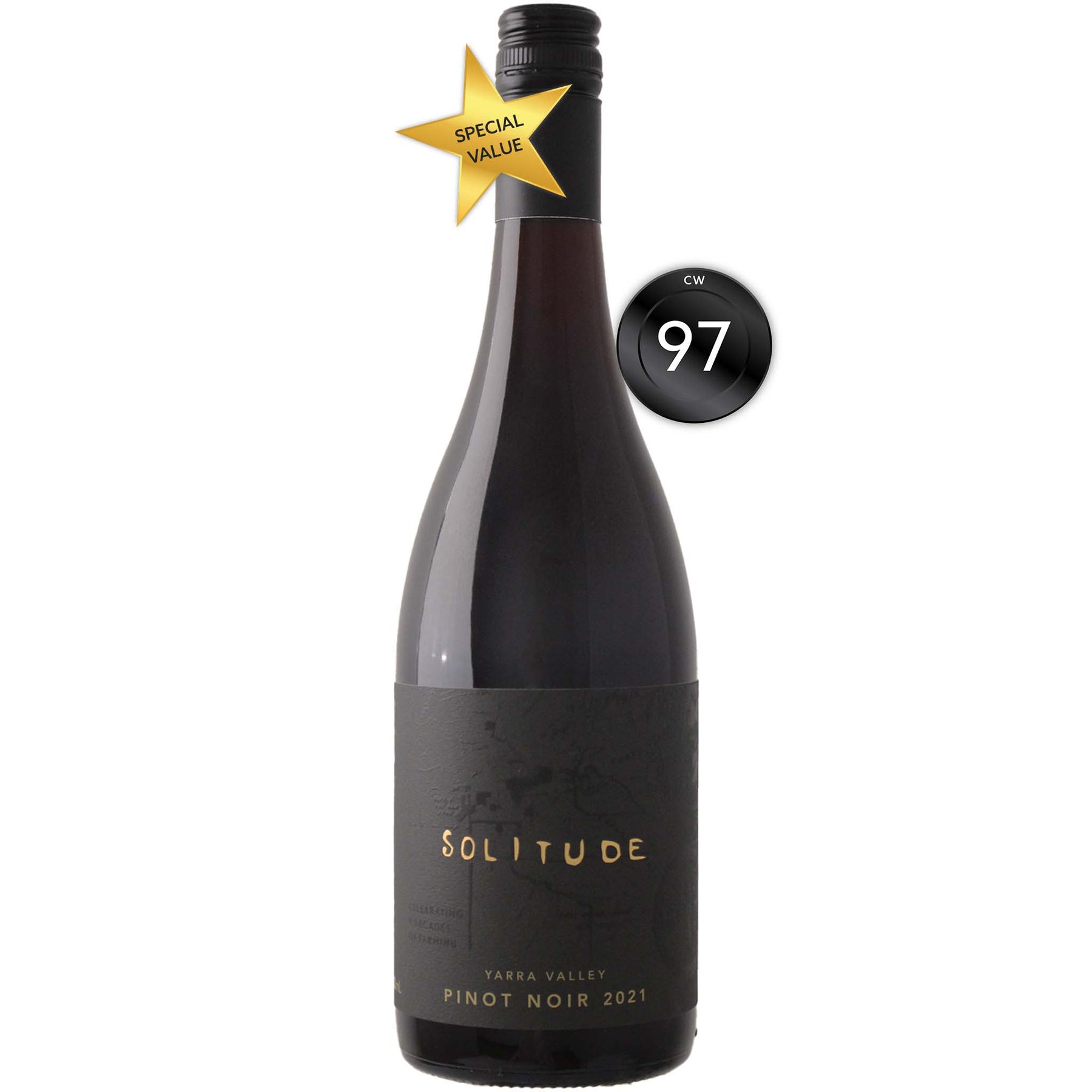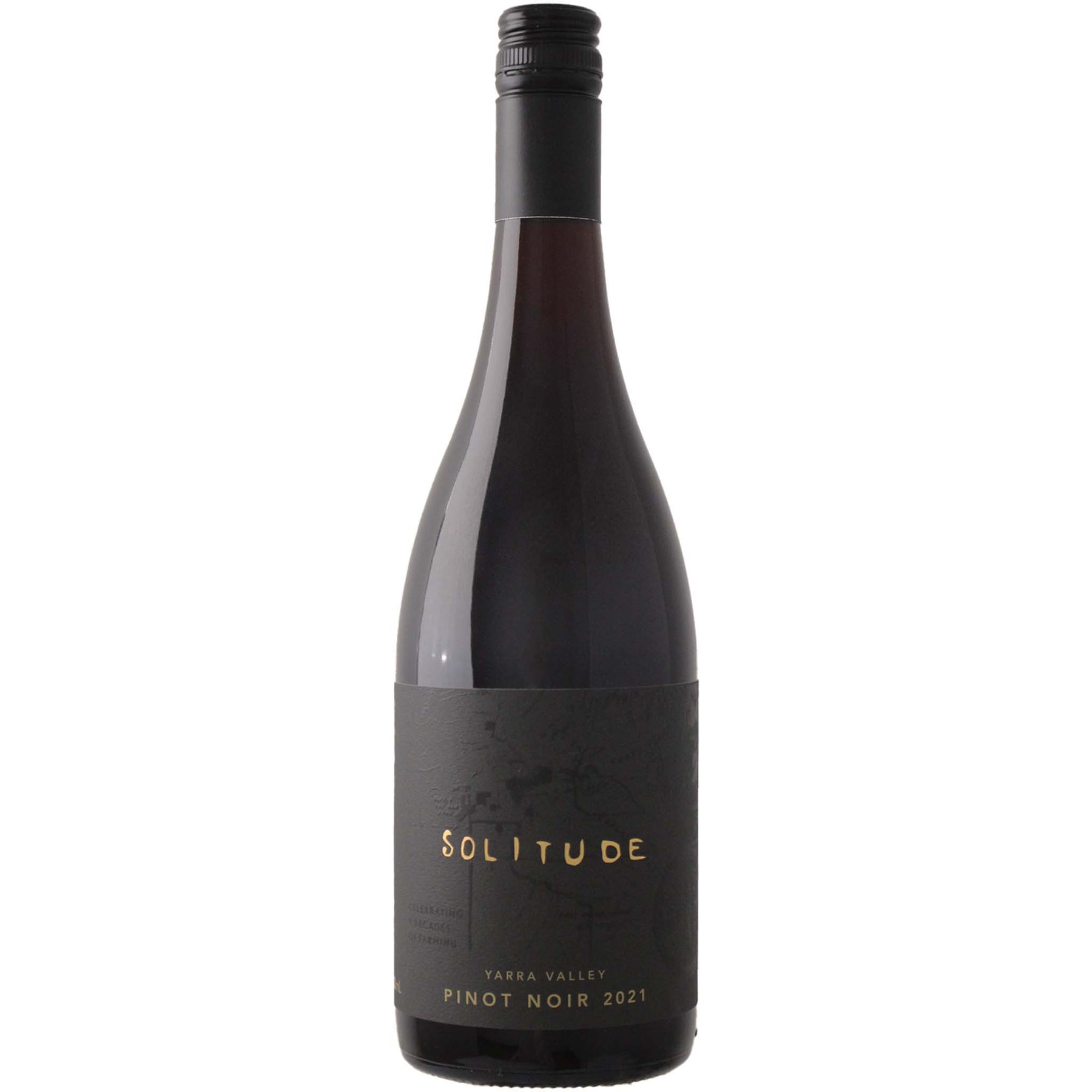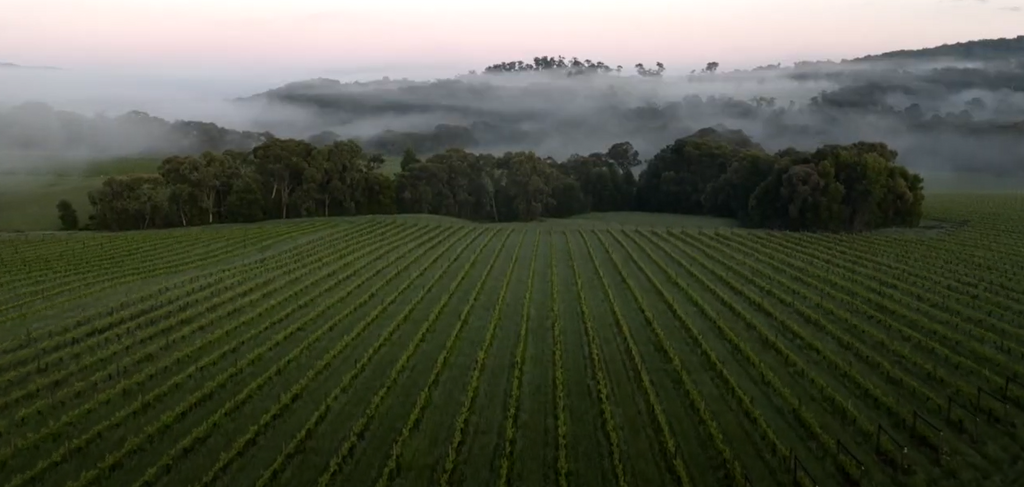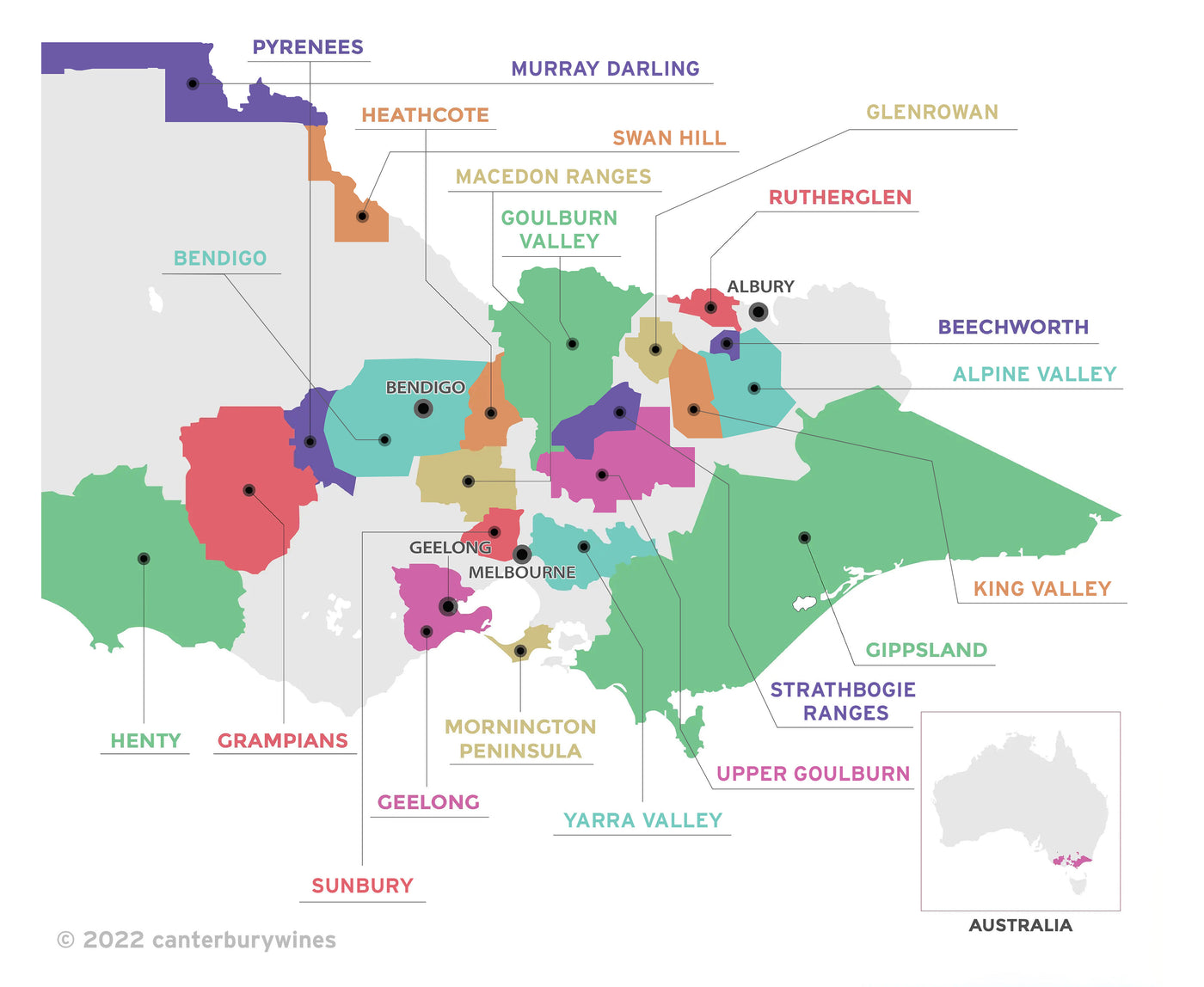

Solitude Pinot Noir 2021
Style: Red Wine
Closure: Screwcap
Solitude Pinot Noir 2021
Warehouse
34 Redland Drive
Vermont VIC 3133
Australia
Producer: Solitude Estate
Country: Australia
Region: Yarra Valley
Vintage: 2021
Critic Score: 97
Alcohol: 13.0%
Size: 750 ml
Drink by: 2035
Solitude Estate is a 29 hectare vineyard located in Yellingbo in the Upper Yarra Valley. Small batches of fruit from the best sites of the vineyard are chosen to be bottled under the Solitude Estate label. The wines are outstanding; no surprise given the special cool climate location, a top vitaculturis in Greg Kerr (Solitude Estate was a Finalist in the Young Gun of Wine Top 50 Australian Vineyards of 2021) and a master winemaker in Andrew Marks (Gembrook Hill and The Wanderer wines). Only a few hundred cases of this delectable pinot were made, so please be quick.
"Immediately appealing, with ripe red cherry and strawberry fruits flooding the succulent palate. Medium bodied and fruit-sweet, with hints of spices and forest floor, it has good weight and depth without being heavy, the tannins silky and long. A salute to the vintage and the very best grapes from the estate. Already a joy to drink, this will still be looking good six years from now." Nick Munday
"Grown on a mixture of volcanic red and gradational brown soils on one of the coolest, late-ripening sites in the Yarra Valley. Comprising two of Solitude’s best performing clones, MV6 and Abel. Grapes 100 % de-stemmed; no whole bunch ferment. Matured for 11 months in French oak (25% new, 75% seasoned). There is very little in the way of fining and filtering to preserve the essence of the wine and express the Solitude terroir.
An enticing, fragrant bouquet with hints of lavender, rose petal and Turkish delight. Good evenness of flavour and integrated tannins and a vibrant palate showing the trademark Upper Yarra red 'ripple', hints of undergrowth, some dark cherry and mild spice characters. Only a few hundred cases made." Solitude Estate
Expert reviews
"What a beautiful Pinot Noir from a great vintage in the Yarra Valley. Immediately appealing, with ripe red cherry and strawberry fruits flooding the succulent palate. Medium bodied and fruit-sweet, with hints of spices and forest floor, it has good weight and depth without being heavy, the tannins silky and long. A salute to the vintage and the very best grapes from the estate. Already a joy to drink, this will still be looking good six years from now." Nick Munday, Canterbury Wines - 97 points and Special Value Wine ★
Awards
Special Value Wine – Canterbury Wines ★
About Greg Kerr

Laurie and Vivienne Kerr purchased their Tibooburra property in 1967 and established a successful Black Angus cattle stud. As the renaissance of the Yarra Valley wine industry gathered momentum in the early 1990s, the Kerr family began receiving approaches from wineries to plant vines on some of the outlying slopes of their property. Enter son Greg Kerr who was never much of a cattleman but liked growing things and was keen to contribute to the family business. Greg established the vineyard in 1996 and what could have been a temporary side-line soon became a passion. He has been at the helm every step of the way as production manager and viticulturist. Almost three decades after the first plantings, Greg is still among the vines doing what he loves, with help from his wife Susan and their four children.
One of the best sidelines of the job is staying close to nature and being able to embrace sustainable farming practices. This includes minimising the use of herbicides and establishing conservation reserves around the vineyard. "We all want to make a go of it, earn a living and maybe even receive recognition that we’ve done something special. But ultimately our key responsibility is to leave the land in better shape than we found it," says Greg.
The text below is taken from an article that appeared in Young Gun of Wine: Solitude Estate was a Finalist in the Top 50 Australian Vineyards of 2021
Greg Kerr’s Solitude Estate may not be a familiar name to many, but its former moniker, Tibooburra Vineyard, will likely ring bells for Yarra Valley enthusiasts. The fruit from the Upper Yarra site is made into wine under Kerr’s estate label but it has also notably contributed to the wines of some of the Yarra’s leading small makers: Gary Mills (Jamsheed), Andrew Marks (The Wanderer), Luke Lambert (Lambert) and Jayden Ong (One Block). While chardonnay and pinot noir are the key varieties, a ’90s roll of the dice on shiraz has also seen the grape star on the 29-hectare vineyard.
Greg Kerr’s parents, Laurie and Vivienne, bought their Yellingbo property in 1967, establishing a successful Black Angus stud on the 1,000-hectare holding. They also, somewhat far-sightedly, began a program of implementing conservation reserves across the property in the ’80s. The first vines were planted in 1996, with additions made in ’97, ’99, 2001, ’05, ’12 and ’20. That last planting was on rootstock, a sign of the recent threat that phylloxera is posing to the Yarra Valley, but the prior ones have all been on own roots. Across the 29 hectares of vines, chardonnay and pinot noir are predictably the dominant varieties, but Kerr also has 3 hectares of sauvignon blanc and 6 hectares of shiraz.
"Being located in the Upper Yarra, the estate is renowned for pinot noir and chardonnay," Kerr says, "so when we began planting shiraz in the late 90s, we were told we were crazy – it would never ripen. Back then, we took an educated gamble that it would not only ripen well, but it would provide us with a genuine point of difference. Two sites were chosen: one an exposed north-west ridge overlooking the Great Divide; the other on a south-westerly aspect facing the Dandenongs."
That gamble certainly paid off, with the shiraz fruit finding its way into a Yering Station single site wine, along with Luke Lambert’s signature syrah for several years, and bottlings from Jamsheed and Jayden Ong’s One Block. "Typically, Solitude shiraz fruit produces a refined linear style of wine, generous in perfume with some Northern Rhône hallmarks, including spice, mocha and black raspberry," says Kerr. Mills also uses chardonnay from the site as well as pinot noir, which Andrew Marks also employs for his The Wanderer label (the side gig to his family’s estate, Gembrook Hill). Marks also makes the Solitude Estate wines for Kerr.
"Andrew plays a crucial role in the styling of our label," says Kerr. "He is a very conscientious operator and has helped me understand the importance of timing in the vineyard. We are constantly in discussion about harvesting fruit at the 'sweet spot', when sugars and acids are in balance, and grapes are physiologically ripe. Ultimately, we want to produce wines that express the vineyard, and that complement the food on the table."
Kerr doesn’t farm by any particular doctrine, employing many organic practices and avoiding "remedial solutions", though minimal herbicides and fungicides are used when necessary. An integrated pest management program is ably supported by the work begun by Kerr’s parents, with the well-established nature reserves not just significantly beautifying the property but also preserving natural waterways and encouraging beneficial insect populations. Kerr has also enhanced this by planting thousands of native trees and shrubs around the vines, and he notes that light brown apple moth - a significant contributor to crop loss in cooler regions - is now no longer much of a problem. Those plantings have also increased the populations of hawks and eagles, which help deter introduced species that cause crop damage.
"I like to try to keep things simple, to work with nature and the four seasons," says Kerr. "One of the best weapons you have as a viticulturalist is to recognise the natural assets of your property, to work carefully with that template, and to be patient. It certainly pays to think in three-to-five-year arches, as it can take that long for certain improvements to reap dividends."

Over the last five years, Kerr has added an under-vine cultivator and rehabilitator plough to his equipment shed, which he says have reduced soil compaction and helped aerate the soils, in turn creating better nutrient cycling with the improvement showing in the fruit. "Vines have a way of showing you whether they are happy or not," Kerr says. "The South African writer Laurens van der Post described animals as the 'eyes of God' and plants as the 'thoughts of God'. As an extension of that idea, I believe that if you farm responsibly and in a sustainable fashion, you will generally be rewarded with good crops."
One of the biggest challenges at Solitude is finding skilled hands to manage the vineyard. "Being at the premium end of the grape supply market, there is an emphasis on attention to detail," says Kerr. "Pruning, canopy management, hand harvesting … it all requires the help of people willing to get out among the vines, to share the load. It really helps if the labour force enjoys working with plants; better still, if they recognise that we are ultimately striving to deliver a special product."
A more reliable labour force is planned for the near future, with Kerr planning to introduce sheep, or more specifically, Wiltipolls – a breed developed in Australian that sheds its wool annually and is not prone to fly strike, making them an adapted, low-maintenance breed ideal for meat production. "I believe the sheep will help keep weeds and grasses under control, add nutrients back into the soil, and will possibly enable us to generate an alternate source of income," he says.
No synthetic fertilisers are used on the vineyard, instead natural measures are employed, such as processed chook manure and seaweed-based products, along with fulvic acid and fish and kelp extracts. "The soil should have plenty of worms, and it should smell 'alive'; canopies should be vibrant green and robust," says Kerr. "If the vines and the soils are in balance, then you are well on the way to a good harvest and ultimately good wines."
Kerr is very conscious of the fact that he is simply today’s custodian of their land, as are all farmers, actively encouraging young family members and students to participate in the operation. "Some of us may have 20 or 30 years to make a go of it, then it will be someone else’s turn," he says. "Clearly, we all want to make a go of it, earn a living and maybe even recognition that we’ve done something special. But ultimately, our key responsibility is to leave the land in better shape than we found it, and to build enduring stories and good social cultures around our endeavours."
It’s no secret that all wine regions are warmer than they used to be, but the location of Solitude Estate is an advantage though some amelioration is still needed. "Being in close proximity to alpine regions means we have a natural buffer against extremes in heat," says Kerr, "so we aim to generate strong canopies partly by using natural tonics, including kelp and fish-based sprays. Another method is to minimise trimming where row orientation means vines are vulnerable to the sun. This means our crops can generally stay on the vine longer… Our grapes usually retain good acidity and delicate flavours even in the extremely hot years, which is a bonus in the winery."
The proximity to the foothills of the Upper Yarra provides distinct weather patterns that work in concert with the distinctive geology to create fruit, and wine, reflective of place. "Soils include Silvan red to deep black volcanic seams," says Kerr, "and we are influenced by a variety of weather streams including alpine patterns from the east, warmer 'prairie' winds from the north-west, even the occasional maritime cool change from the south-west. All these influences create an interesting and unique terroir – and an ideal template for our grapes and resultant wines."
About the winery

In 1967, Laurie and Vivienne Kerr purchased their 1000 hectare Tibooburra property located in Yellingbo in the Upper Yarra Valley. They established a very successful Black Angus cattle stud, culminating in Tibooburra being chosen as a host property for the 1997 World Angus Forum, attracting hundreds of Angus breeders from around the globe.
With the renaissance of the Yarra Valley wine industry in the early 1990s, the Kerrs decided to plant vines on some of the outlying slopes of their property. The first vines were planted in 1996 - 14 hectares of Chardonnay and Pinot Noir – followed by 3 hectares of Shiraz in 1997. Further plantings of Chardonnay and Pinot Noir were undertaken in 1999, 2001, 2005, 2012 and 2020, while another 3 hectares of Shiraz were added in 2001. The vineyard now comprises 29 hectares of vines, predominantly Pinot Noir and Chardonnay (20ha) together with smaller plantings of Shiraz (6ha) and Sauvignon Blanc (3ha).
The first wines under the Tibooburra Vineyard Label were released in 2002, however, most of the grapes around that time were sold to other wineries, principally Yering Station and McWilliams. Subsequently, grapes have been sold to the cream of Yarra’s leading small makers - Gary Mills (Jamsheed), Andrew Marks (The Wanderer), Luke Lambert (Lambert) and Jayden Ong (One Block) - together with Bill Downie (William Downie) and Gary Mills (Jamsheed). Add to this the list Coldstream Hills, one of my favourite Yarra Valley wineries, who have been purchasing grapes for the last 15 years and are currently Solitude Estate's largest buyer.
Only small batches of fruit from the best sites of the vineyard are chosen to be bottled under the Solitude Estate label. This will only usually be 5-10% of the harvest, which gives an indication of how special the wines can be.
In 2008 the label was changed from Tibooburra to 'Solitude' following the discovery of a rare 1854 County of Evelyn surveyor’s map which detailed the district’s first pastoralists and the vast tracts of grazing stations in the upper Yarra Valley where cattle and sheep were free to roam. Overlay that map with present day maps of Yellingbo and Hoddles Creek and there is no doubt that Solitude Estate (originally Tibooburra Vineyard) is an intrinsic part of the original Solitude run.
Laurie and Vivienne's son, Greg Kerr, established the vineyard in 1996. Greg was never much of a cattleman but liked growing things and was keen to contribute to the family business. He has been at the helm every step of the way as production manager and viticulturist. Almost three decades after the first plantings, Greg is still among the vines doing what he loves, with help from his wife Susan and their four children.
Greg has a special talent - Solitude Estate was a Finalist in Young Gun of Wine's Top 50 Australian Vineyards of 2021. His aim is to work closely with nature and to produce premium wines in small batches with minimal intervention to preserve their natural character. "Not a day goes by without learning something new here, which in turn refines our management of the vineyard, and ultimately translates to superior wines," says Kerr. The wines has been made since 2007 by master winemaker Andrew Marks, who makes wine for his family's Gembrook Hill Label and his own The Wanderer label - two very special Yarra Valley wineries.

Victoria
Victoria is home to more than 800 wineries across 21 wine regions. The regions are Alpine Valley, Beechworth, Bendigo, Geelong, Gippsland, Glenrowan, Goulburn Valley, Grampians, Heathcote, Henty, King Valley, Macedon Ranges, Mornington Peninsula, Murray Darling, Pyrenees, Rutherglen, Strathbogie Ranges, Sunbury, Swan Hill, Upper Goulburn and Yarra Valley.
Victoria's first vines were planted at Yering in the Yarra Valley in 1838. By 1868 over 3,000 acres had been planted in Victoria, establishing Victoria as the premier wine State of the day. Today, the original vineyards planted at Best's Wines are among the oldest and rarest pre-phylloxera plantings in the world.
Victoria's climate varies from hot and dry in the north to cool in the south and each wine region specialises in different varietals. For example, Rutherglen in the north is famous for its opulent Muscats and Topaque and bold reds, while the many cooler climate regions near Melbourne produce world class Chardonnay and pinot Noir. Victoria is truly a wine lover's playground.



